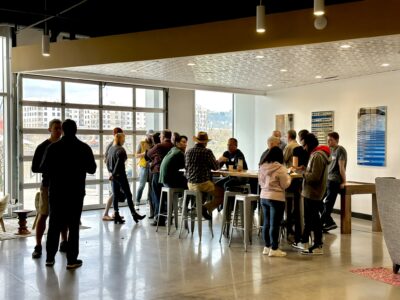The ongoing discussion around how investing in infrastructure can help alleviate the pandemic-induced economic downturn is hard to avoid. Roads, bridges, water, and other vital assets continue to degrade, and it’s going to take more than “talking the talk” to find a sustainable solution.
Infrastructure management is an art, but unlike artistic talent, these skills aren’t innate. The ability to juggle a limited budget or field unexpected emergencies, all while under the scrutiny of citizens, comes from trial and error.
For many local governments, the ability to prioritize maintenance is another skill that doesn’t come easy. The portion of a community’s budget dedicated to road maintenance is often the first to feel the pinch in times of cuts, and roads have been infamously under-funded for years. With the cost to pave one mile of new roadway coming in at $1 million, it may seem like a luxury to many communities.
So if we’re fighting a losing battle, how do we move forward?
The solution requires a shift in perspective. An aggressive overhaul can sound exciting, but it’s logistically complicated. In contrast, focusing on progress over perfection will deliver tangible results over time.
Our infrastructure will not heal overnight. While perfection might look like a sleek, freshly paved piece of asphalt, progress begins with preventative maintenance.
Planning long-term preventative road maintenance can be overwhelming, but modern-day advancements are impressive. Gone are the days of focusing on the meticulous, repetitive task of driving a road network looking for potholes and manually noting its condition on paper. Machine learning and integrating custom pavement condition data into planning have made the process more objective, streamlined, and actionable. Instead of “good” vs. “bad” roads, they need to plan the right maintenance at the right time for the right road within the larger scheme of things.
But many local governments are resistant to change, not fully grasping just how much impact subjectivity has on the final road assessment results. The use of powerful technology is prevalent in daily life, so they have no reasonable justification for not applying it to solve their problems. Showing governments how decisions made using custom, objective data can affect their budgets and bottom line is crucial.
In this way, progress over time is much more economical than perfection.
Since 2016, RoadBotics has advocated for governments to take the leap into digitizing their public infrastructure assets. Using a smartphone and RoadBotics machine learning algorithm, communities can capture high-definition imagery of their assets and receive ratings complete with “pavement distress identification,” including potholes and fatigue cracking. RoadBotics has empowered more than 200 communities to make data-driven decisions, and to prioritize progress over perfection.
***

Samantha Stephan is a part of the RoadBotics Marketing Team in Pittsburgh. RoadBotics empowers governments and communities to make objective, data-driven decisions about their public infrastructure assets. We automate image mapping and road assessments, generating interactive maps, unbiased ratings, and practical tools to save time and taxpayer dollars for hundreds of communities across the country and around the world. Sam, and the RoadBotics Team, can be contacted at info@roadbotics.com with any questions or comments.
Join the conversation!
Find news, events, jobs and people who share your interests on Technical.ly's open community Slack




